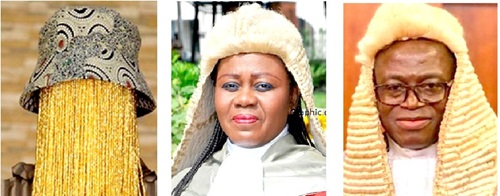
Justice Baah was not biased towards Anas — Supreme Court
The Supreme Court has held that it dismissed an application by investigator, Anas Aremeyaw Anas because his contention that a High Court judge was biased towards him is not supported by law.
Advertisement
Anas had filed a certiorari application at the apex court seeking the nullification of a High Court’s decision which dismissed his defamation suit against the Member of Parliament for Assin Central, Kennedy Ohene Agyapong.
The defamation suit was based on public statements made and a broadcast by the MP, accusing Anas of being evil and blackmailing people in the name of investigative journalism.
Anas’ grounds for the certiorari application challenging the judgment were that the trial judge - Justice Eric Baah, a Justice of the Court of Appeal, sitting as a High Court judge, had no jurisdiction to hear the suit and that the judge was also biased towards him.
On February 25 this year, the Supreme Court, in a 3-2 majority decision, dismissed the application and reserved the full reasoning in the judgment, which was later filed at the court’s registry, making it public.
The Chief Justice, Justice Gertrude Sackey Torkornoo, Justices Henrietta Mensa-Bonsu and Samuel Asiedu were on the majority side, while Justices Issifu Omoro Tanko Amadu and Emmanuel Yonny Kulendi dissented.
“Investigative terrorism”
In the High Court judgment dated March 15 last year, Justice Baah held that although the words spoken by Mr Agyapong against Anas were capable of defamation, they were factual and therefore, they could not be said to be defamatory as the defence of justification exonerated the MP.
Justice Baah then went ahead to make certain findings based on his analysis of the evidence before him and held that the MP was right in calling Anas “evil, blackmailer, an extortionist, criminal and corrupt.”
Again, the judge in the judgment described the work of Anas as “investigative terrorism” and not “investigative journalism.”
"It should be understood that as officers caught by plaintiff in his investigations have lost their jobs, an entrapped President may be compelled to resign out of shame or public pressure.”
That means the plaintiff, through his investigative antics can cause the removal of a President, and thereby the mandate given to him at the election. This is not investigative journalism.
It is investigative terrorism. It is an exercise of indirect political power under the cloak of journalism,” Justice Baah held in the judgment.
The above statement by Justice Baah was one of the statements in the judgment, Anas relied on to support his assertion that the judge had a real likelihood of bias towards him.
No bias
However, in dismissing the ground of bias, the Supreme Court, in its decision, authored by Justice Asiedu, held that although the words of Justice Baah may be strong, it was not an indication that he was biased or had a dislike towards Anas.
Rather, the court held that the statement was an analysis of the evidence before the trial court which was the duty of any judge adjudicating over a matter.
According to the court, the statement by Justice Baah was not made in a vacuum, as there was video evidence before the trial court which allegedly showed Anas, one Amakye and a Shiekh plotting to entrap the Prime Minister of Ivory Coast and the President of Ghana.
“Is the applicant (Anas) saying that a trial judge has no right to examine and analyse the evidence placed before him and draw inferences and make findings of fact?
“In my opinion, the statements referred to are the inferences and findings of facts which the learned trial judge dutifully made and for that matter they cannot reasonably be described as constituting bias and be clothed with the garb of prejudice against the applicant,” the apex court held.
Appeal
In a concurring opinion supporting the majority decision, the Chief Justice held that indeed the statements by Justice Baah were his findings and inferences based on his evaluation of the evidence which were placed before him.
According to the Chief Justice, whether or not the evaluation of the evidence by Justice Baah was erroneous, required an evaluation of the evidence again, which was not possible in the instant judicial review application brought by Anas, but rather ought to be done on appeal.
“My conclusion is that the issue of the sustainability of the judge's words used to describe the applicant can only be a matter determinable by the appellate court.
It is not the place of this court to question the basis for any findings and conclusions that have been reached by a trial judge when the court does not have the full records of proceedings,” Justice Torkornoo held.
Dissenting opinions
Justice Kulendi, in his dissenting opinion, held that the words used by Justice Baah clearly showed that he had a prejudice against Anas.
He wondered why the court, hearing a civil matter of defamation, ended up making criminal findings against Anas.
“I find it even more perplexing that a court exercising civil jurisdiction would find that the applicant is guilty of having taken bribes, and being dishonest, fraudulent, a cheat, an extortionist, a thief, a blackmailer and corrupt,” Justice Kulendi held.
For Justice Amadu, the view by the majority that the remedy for Anas was an appeal and not a judicial review application would diminish the supervisory jurisdiction of the Supreme Court which had been prescribed by the Constitution.
Writer’s email: [email protected]




